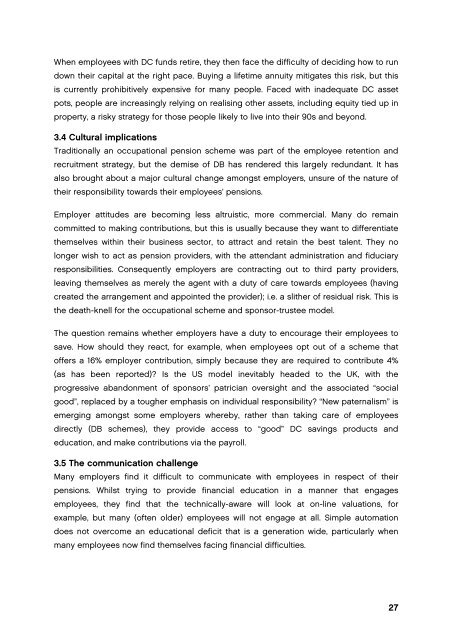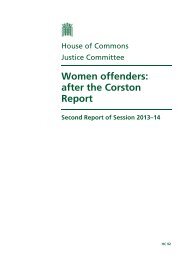Simplification is the key - Centre for Policy Studies
Simplification is the key - Centre for Policy Studies
Simplification is the key - Centre for Policy Studies
You also want an ePaper? Increase the reach of your titles
YUMPU automatically turns print PDFs into web optimized ePapers that Google loves.
When employees with DC funds retire, <strong>the</strong>y <strong>the</strong>n face <strong>the</strong> difficulty of deciding how to run<br />
down <strong>the</strong>ir capital at <strong>the</strong> right pace. Buying a lifetime annuity mitigates th<strong>is</strong> r<strong>is</strong>k, but th<strong>is</strong><br />
<strong>is</strong> currently prohibitively expensive <strong>for</strong> many people. Faced with inadequate DC asset<br />
pots, people are increasingly relying on real<strong>is</strong>ing o<strong>the</strong>r assets, including equity tied up in<br />
property, a r<strong>is</strong>ky strategy <strong>for</strong> those people likely to live into <strong>the</strong>ir 90s and beyond.<br />
3.4 Cultural implications<br />
Traditionally an occupational pension scheme was part of <strong>the</strong> employee retention and<br />
recruitment strategy, but <strong>the</strong> dem<strong>is</strong>e of DB has rendered th<strong>is</strong> largely redundant. It has<br />
also brought about a major cultural change amongst employers, unsure of <strong>the</strong> nature of<br />
<strong>the</strong>ir responsibility towards <strong>the</strong>ir employees’ pensions.<br />
Employer attitudes are becoming less altru<strong>is</strong>tic, more commercial. Many do remain<br />
committed to making contributions, but th<strong>is</strong> <strong>is</strong> usually because <strong>the</strong>y want to differentiate<br />
<strong>the</strong>mselves within <strong>the</strong>ir business sector, to attract and retain <strong>the</strong> best talent. They no<br />
longer w<strong>is</strong>h to act as pension providers, with <strong>the</strong> attendant admin<strong>is</strong>tration and fiduciary<br />
responsibilities. Consequently employers are contracting out to third party providers,<br />
leaving <strong>the</strong>mselves as merely <strong>the</strong> agent with a duty of care towards employees (having<br />
created <strong>the</strong> arrangement and appointed <strong>the</strong> provider); i.e. a sli<strong>the</strong>r of residual r<strong>is</strong>k. Th<strong>is</strong> <strong>is</strong><br />
<strong>the</strong> death-knell <strong>for</strong> <strong>the</strong> occupational scheme and sponsor-trustee model.<br />
The question remains whe<strong>the</strong>r employers have a duty to encourage <strong>the</strong>ir employees to<br />
save. How should <strong>the</strong>y react, <strong>for</strong> example, when employees opt out of a scheme that<br />
offers a 16% employer contribution, simply because <strong>the</strong>y are required to contribute 4%<br />
(as has been reported)? Is <strong>the</strong> US model inevitably headed to <strong>the</strong> UK, with <strong>the</strong><br />
progressive abandonment of sponsors’ patrician oversight and <strong>the</strong> associated “social<br />
good”, replaced by a tougher emphas<strong>is</strong> on individual responsibility? “New paternal<strong>is</strong>m” <strong>is</strong><br />
emerging amongst some employers whereby, ra<strong>the</strong>r than taking care of employees<br />
directly (DB schemes), <strong>the</strong>y provide access to “good” DC savings products and<br />
education, and make contributions via <strong>the</strong> payroll.<br />
3.5 The communication challenge<br />
Many employers find it difficult to communicate with employees in respect of <strong>the</strong>ir<br />
pensions. Whilst trying to provide financial education in a manner that engages<br />
employees, <strong>the</strong>y find that <strong>the</strong> technically-aware will look at on-line valuations, <strong>for</strong><br />
example, but many (often older) employees will not engage at all. Simple automation<br />
does not overcome an educational deficit that <strong>is</strong> a generation wide, particularly when<br />
many employees now find <strong>the</strong>mselves facing financial difficulties.<br />
27

















